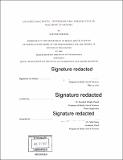| dc.contributor.advisor | Rosalind Wright Picard. | en_US |
| dc.contributor.author | Dinakar, Karthik | en_US |
| dc.contributor.other | Program in Media Arts and Sciences (Massachusetts Institute of Technology) | en_US |
| dc.date.accessioned | 2017-12-05T19:16:41Z | |
| dc.date.available | 2017-12-05T19:16:41Z | |
| dc.date.copyright | 2017 | en_US |
| dc.date.issued | 2017 | en_US |
| dc.identifier.uri | http://hdl.handle.net/1721.1/112523 | |
| dc.description | Thesis: Ph. D., Massachusetts Institute of Technology, School of Architecture and Planning, Program in Media Arts and Sciences, 2017. | en_US |
| dc.description | Cataloged from PDF version of thesis. Due to the condition of the original material with text runs off the edges of the pages, the reproduction may have unavoidable flaws. | en_US |
| dc.description | Includes bibliographical references (pages 167-172). | en_US |
| dc.description.abstract | Generative models are venerated as full probabilistic models that randomly generate observable data given a set of latent variables that cannot be directly observed. They can be used to simulate values for variables in the model, allowing analysis by synthesis or model criticism, towards an iterative cycle of model specification, estimation, and critique. However, many datasets represent a combination of several viewpoints - different ways of looking at the same data that leads to various generalizations. For example, a corpus that has data generated by multiple people may be mixtures of several perspectives and can be viewed with different opinions by others. It isn't always possible to represent the viewpoints by clean separation, in advance, of examples representing each perspective and train a separate model for each point of view. In this thesis, we introduce lensing, a mixed-initiative technique to (i) extract lenses or mappings between machine-learned representations and perspectives of human experts, and (2) generate lensed models that afford multiple perspectives of the same dataset. We explore lensing of latent variable model in their configuration, parameter and evidential spaces. We apply lensing to three health applications, namely imbuing the perspectives of experts into latent variable models that analyze adolescent distress and crisis counseling. | en_US |
| dc.description.statementofresponsibility | by Karthik Dinakar. | en_US |
| dc.format.extent | 172 pages | en_US |
| dc.language.iso | eng | en_US |
| dc.publisher | Massachusetts Institute of Technology | en_US |
| dc.rights | MIT theses are protected by copyright. They may be viewed, downloaded, or printed from this source but further reproduction or distribution in any format is prohibited without written permission. | en_US |
| dc.rights.uri | http://dspace.mit.edu/handle/1721.1/7582 | en_US |
| dc.subject | Program in Media Arts and Sciences () | en_US |
| dc.title | Lensing Machines : representing perspective in machine learning | en_US |
| dc.type | Thesis | en_US |
| dc.description.degree | Ph. D. | en_US |
| dc.contributor.department | Program in Media Arts and Sciences (Massachusetts Institute of Technology) | en_US |
| dc.identifier.oclc | 1012939023 | en_US |
